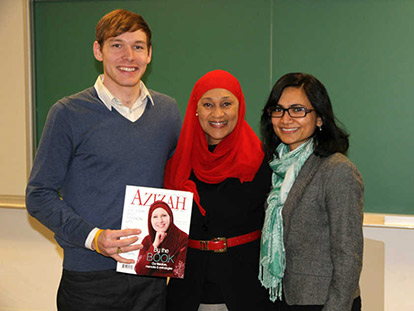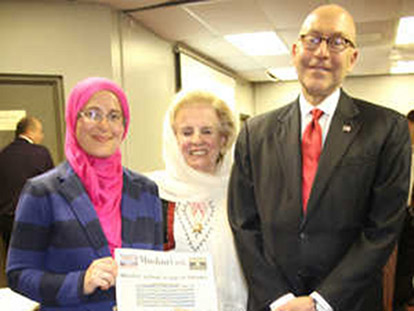Dec
Dec
Youth key to better US- Muslim relations: Farah Pandith, US Special Representative to Muslim Communities
Written by Sana SyedUnited States' Special Representative to Muslim Communities, Farah Pandith, was in Canada between Nov. 15 and 17 “engaging” with Muslim communities and organisations on behalf of her boss, U.S. Secretary of State Hillary Clinton.
On Nov. 16, at a meeting with ethnic media hosted at the US Embassy, Ms. Pandith spoke about her mandate and what her government is doing to reach out to Muslim communities in the U.S. and around the world.
For many people, the idea of American engagement with Muslim communities around the world is associated with images of the war in Afghanistan, the invasion of Iraq and special forces raids into Pakistan.
Less is known about the gentler approach led by Ms. Pandith, whose role was established by President Obama two years ago -- an appointment unprecedented in American history. Her office is responsible for executing Secretary of State Hillary Clinton's vision for engagement with Muslims around the world.
Ms. Pandith, 43, is all about grassroots engagement and especially interested in young Muslims. There is a simple reason for getting them while they're young -- demographics.
In her talk, Ms Pandith emphasised the dialogue based nature of her work. The Kashmir-born Muslim, who emigrated to the US with her parents at the age of one, has traveled widely at home and abroad, talking to community groups, high schools, universities artists, business and faith leaders around the world, encouraging Muslim society groups to discuss their problems with her so as to and engage them in lasting relationship with the U.S. government that is based on “mutual respect and mutual interest.”
“Us” vs. “Them”
But what is the need to create this long-term relationship? And what is the importance of starting at grassroots? Is it simply to change the image of Muslims, or for Muslims to gain a sense of belonging?
The idea is to redefine identity, she says, and create a new narrative for Muslims. Ms. Pandith noted that this generation is having a very hard time navigating through its identity due to issues presented by globalization.
“Despite diversity, one thing is consistent with this generation and that is the issue of identity,” she says. What does it mean to be modern and Muslim? What is the difference between culture and religion? These are the questions they ask, she says.
Articulating America's attempts at fostering a positive dialogue with the world's 1.4 billion Muslims, Ms. Pandith made clear that she tries not to speak of a single monolithic “Muslim world”. She stressed the importance of listening and engaging with as many diverse people and communities as possible.
“When we talk about the West, Muslims are part of the West. There are 30 million Muslims in Western Europe. There are millions of Muslims in America,” she says. “It's not us versus them.” Ms. Pandith adds. “It's not the West versus the East.”
Despite Ms. Pandith's assertions, a cursory glance at the US media after September 11 leaves no doubt as to the triumph of Samuel Huntington and his much-discussed thesis on The Clash of Civilizations. The media framed the whole crisis within the context of Islam, of cultural conflicts, and of Western civilisation threatened by the Other.
The power of the mainstream media is such that although Islamic countries have a rich cultural, intellectual and scientific heritage that was a foundation for the development of the West, the overwhelming perception is that Easterners are uncivilized. This perception is made stronger by the fact that most Western countries are today more developed than those in the East.
”˜'It is important that we debunk the idea of a “clash of civilizations” - there is no clash of civilizations,'' Ms. Pandith says
Youthquake
Aside from the need to eradicate divisions such as the “East” and “West” and “Muslim World” (there are Muslims in the West too!) which are equivalent to “them” and “us”, there is also need to pay greater attention to the youth, Ms. Pandith says.
The Special Representative highlighted the importance of the youth demographic in her work and explored the impact of media, technology and culture in shaping the way young people under the age of 30 define their identity; the way they build networks or communities and deal with discrimination. She shared her observations of a “youthquake” -- young people rebelling against the idea of being defined or labeled by others and wanting to be heard. It is this generation that she calls “Generation Change”.
Social media networks such as Facebook are a very important phenomenon that makes this generation vastly different from pre-internet generations. It is a generation that, despite their differences around the world, is really eager to take part in a global conversation; a generation that, unlike any generation before, is connected because of social media and the capacity of technology, she says.
With social networking, a safe place is created where people from different countries and cultures are beginning to share their thoughts more and more. And people can see what other people are thinking and reading in real time with networks like Twitter and Facebook.
And while it seems strange that officials would listen to young people on the internet, Farah Pandith says that the US wants to hear what these young people want to say because it will impact politics and policies on a global scale like never before.
2011 Hours against Hate
Prior to concluding her discussion, Ms. Pandith explained why diversity and equality are important, and spoke of her new campaign: “2011 Hours Against Hate”. The aim of the campaign is to “stop bigotry and promote respect across lines of culture, religion, tradition, class and gender”.
The campaign, launched by Ms. Pandith and her counterpart the Special Envoy to Monitor and Combat Anti-Semitism Hannah Rosenthal in February this year, asks young people to volunteer their time for someone who “doesn't look like them, live like them or pray like them.”
This article was produced exclusively for Muslim Link and should not be copied without prior permission from the site. For permission, please write to info@muslimlink.ca.











